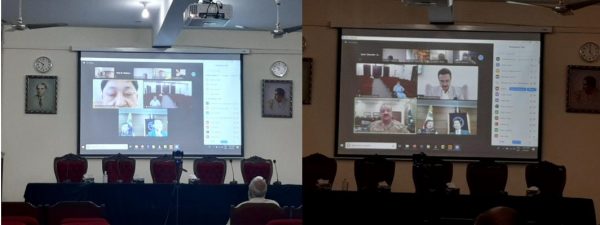“Pandemic Preparedness: Science and Countermeasures” – AASSA-PAS Webinar II – Sub-Theme: Pandemics Preparedness, One Health: Lessons Learnt (May 4, 2021)

Pakistan Academy of Sciences (PAS) and the Association of Academies and Societies of Sciences in Asia (AASSA) with the support of InterAcademy Partnership (IAP) organized an AASSA-PAS Webinar II on “Pandemics Preparedness, One Health: Lessons Learnt” on May 4, 2021, in the Pakistan Academy of Sciences. Speakers from Pakistan, Bangladesh, China, Indonesia, Japan, Turkey and Sri Lanka delivered talks. Dr. Fazal e Hadi, Chairman Islamabad Healthcare Regulatory Authority inaugurated the Webinar. Dr. Fazal e Hadi noted that the Islamabad Healthcare Regulatory Authority (IHRA) is an autonomous health regulatory body enacted under the Islamabad Health Regulation Act, 2018, and discussed the efforts of the IHRA for educating and making people aware to follow standard operating procedures (SOPs) and standardize their living to counter this pandemic. He stressed on the need to provide evidence for awareness. He recommended that strengthening of leadership and provision of vaccines to everybody is the only way forward to combat the pandemic.
Prof. Khalid Mahmood Khan, President of the Pakistan Academy of Sciences welcomed all the speakers, guests, and organizers of the webinar. He appreciated the efforts of PAS and AASSA for arranging these webinars in this difficult time of the COVID-19 pandemic. Prof. Yoo Hang Kim, President AASSA, appreciated collective efforts of various stakeholders in organizing the webinar for the awareness and strengthening of SOPs across the world. He recommended inviting more people in the future to speak about this epidemic. He emphasized on making people aware of this pandemic. Prof. Zabta Khan Shinwari, Chief Organizer of the Webinar, thanked all the speakers of the Inaugural Session and the Chief Guest for being part of the Webinar Series. He explained scientific reasons as to why to observe social distancing. Coronavirus drifts through the air in microscopic droplets: the science of the infectious aerosols. Wearing masks and practicing social distancing can, in large part, prevent people from spreading or inhaling aerosols.
Prof. Muhammad Ali (Vice Chancellor, Quaid-i-Azam University, Islamabad, Pakistan) and Prof. Zabta Khan Shinwari (Chief Organizer of the Webinar) served as the moderators of this webinar. Different countries shared their experiences on covid-19. Prof. Nariyoshi Shinomi, from Japan highlighted the current situation of COVID-19 in Japan, while Prof. Zabta Shinwari sensitized the participants about biosecurity & neglected aspects of pandemics in Pakistan. KThe keynote address by Prof. Jinghua Cao (Executive Director, Alliance of International Science Organizations, ANSO) discussed the efforts of ANSO members to counter the COVID-19 epidemic. He emphasized the role of ANSO to bring people together and promote solidarity and unity within ANSO to oppose the spread of this epidemic collectively. Prof. Dr. Mehmet Bulut (Member, TUBA) emphasized the importance and role of social finance in achieving SDGs objectives. He expressed the need for sustainable development that incorporates meeting the needs of the present and future. Other issues discussed included:
- Vaccinomics and probable prevention strategy against avenging zoonotics
- Nanotechnologies for COVID-19 theranostics
- Development of biodegradable surgical facemask made of marine algae to confront COVID-19 pandemic challenges.
- Understanding COVID-19 pandemic concerning anti-scientific and pseudoscientific world views
- The effective role of the scientists to counter the infodemic
- Practices of complementary & alternative medicines in COVID-19 pandemic
While giving concluding remarks Prof. Zabta Shinwari, emphasized on collective working to share data and lead the research on the pandemic to reduce the overall impact of this epidemic. All the stakeholders and researchers should work together to collaborate and find out how epidemics can be controlled and the economy can be improved. He gave recommendations on regulating media, proper law enforcement, and handling misinformation to support each other against this pandemic.
The consensus emerged on “A One Health Approach to Preventing the Next Pandemic”. Instead of waiting for the next deadly microbe to spill over into humans, public health experts and policy-makers must confront the drivers of zoonotic diseases. Some countries have a long tradition of people eating wild animals and using them in traditional medicines—practices that likely increase the transmission risks of microbes from animals to humans, causing what are called zoonotic diseases. The beginning of this pandemic is reminiscent of another disease caused by a coronavirus, severe acute respiratory syndrome (SARS), which also originated in a live animal market in China. A chef who regularly cooked with exotic animals was one of the earliest persons to be diagnosed with SARS. A coronavirus is also responsible for causing the Middle East respiratory syndrome (MERS). MERS viral genomic studies suggest that the virus is endemic to camels in Saudi Arabia. With a mortality rate estimated at nearly 35%, MERS is much deadlier than its coronavirus cousins, but more difficult to contract. For MERS, the initial camel-to-human transmission appears to have occurred via nasal secretions from four sick camels.
